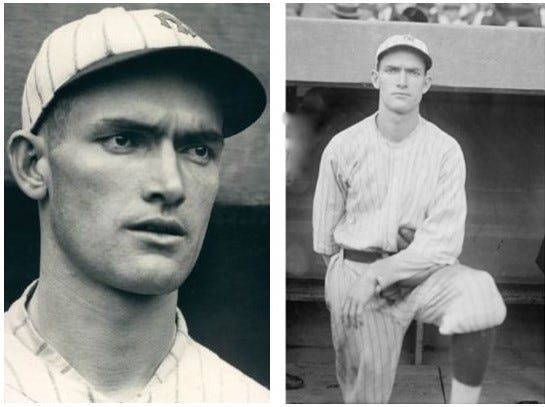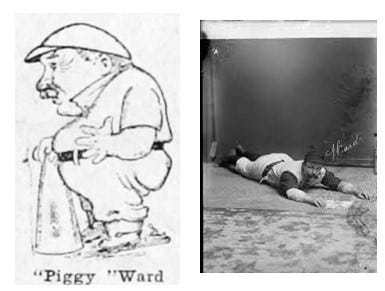Backroads and Ballplayers #63
Stories of the famous and not-so-famous men and women from the days when baseball was "Arkansas' Game." Always free and always short enough to finish in one cup of coffee.
Starting Over - Rebuilding a Roster and Saving the Travs
Rebuilding is one of those words we see in sports columns almost daily. As soon as a team finishes its season, the projections for the next campaign are in the news. Actually, “news” is not the correct term. News has almost disappeared from sports headlines unless it is BIG news. “Analysis” is much more popular, and an analysis that stirs opinion is especially fashionable.
So as usual, Razorback baseball is rebuilding. According to Dave Van Horn, we should get used to it. It is the reality of college baseball.
“We’re going to lose almost all our players again for the third year in a row, really, since 2021, we’ve had to almost start over.” —From Whole Hog Sports
Things may not have ended well, but there is reason for optimism. The Hogs have some pitching, a shortstop, and maybe an SEC-caliber catcher. Will McEntire is returning, and now Kendall Diggs is committed to another year.
Is there any doubt that Kendall Diggs played hurt in 2024? He did not look like the clutch hitter in the middle of the lineup Arkansas fans know he can be. If the “old Kendall Diggs” returns in the spring of 2025, he will be the kind of experienced player who never seems to play past his draft eligibility. I predict he will be our guy in 2025.
Going and Coming
The Hogs lost a few players to the transfer portal. Everyone wants to play, and hanging around and working like Will McEntire is rare. The most significant impact on the roster is, of course, the MLB Draft.
Below is a list of the Arkansas players chosen in the draft, the estimated value of their selection slot, and a look at a few of the new guys who might make an immediate impact.
Probable major league signees:
LHP Hagen Smith - Round 1, Pick 5 to Chicago White Sox - $7.76 million
2B Peyton Stovall - Round 4, Pick 117 to Cincinnati Reds - $618,800
LHP Mason Molina - Round 7, Pick 215 to Milwaukee Brewers - $257,400
3B Jared Sprague-Lott - Round 9, Pick 256 to Oakland Athletics - $201,300
C Hudson White - Round 9, Pick 267 to Boston Red Sox - $194,600
1B Ben McLaughlin - Round 9, Pick 284 to Arizona Diamondbacks - $187,800
RHP Jake Faherty - Round 11, Pick 334 to Miami Marlins $?
RHP Brady Tygart - Round 12, Pick 357 to Boston Red Sox $?
Drafted High School Signees:
SS Tyson Lewis - (High School) Round 2, Pick 51 to Cincinnati Reds $1.80 million
OF Eli Lovich - (High School) Round 11, Pick 332 to Chicago Cubs $?
Four of the many promising newcomers:
Kuhio Aloy IF- Previous School: BYU - 2025 Classification: Sophomore - Wailuku, Hawaii. The younger brother of Arkansas shortstop Wehiwa, Kuhio Aloy was named to the freshman All-Big 12 team
Zach Root P - Previous School: East Carolina- 2025 Classification: Junior - Fort Myers, Florida. Root was 6-2 at ECS. Rated as high as the number 4 pitcher in the portal.
Brent Iredale IF, Previous School: New Mexico Junior College - 2025 Classification: Junior - Sydney, Australia. Rated the No. 2 JUCO prospect by Prep Baseball Report, Iredale batted .441 with 25 home runs in 58 games.
Carson Wiggins P - Roland OK High School - Wiggins was rated by Perfect Game as the top pitcher in the state of Oklahoma for the 2024 class.
Saving the Travelers - “Billy” From Clarksville Becomes the Squarest Man in Baseball
Twenty-year-old Billy Kavanaugh arrived in Clarksville, Arkansas, in the summer of 1885. Young Billy had recently graduated from Kentucky Military Institute. The educated son of the Confederacy found a job as a banker and according to society reports made “many warm friends” in Johnson County. Among those new friends was Ida Floyd, Billy Kavanaugh’s future wife.
Life in Clarksville was good for Billy Kavanaugh, but he was an ambitious young fellow and new opportunities came fast. While at Clarksville, Kavanaugh had been the local correspondent for the Arkansas Gazette. In April of 1886, after less than a year as a reporter, the newspaper offered him the position of city editor in Little Rock, and Kavanaugh moved to the state capitol.
By 1890, the Gazette had promoted Kavanaugh to managing editor. He and Ida Floyd had married the previous year, and as the new century approached, the young newspaperman had become a prominent name in Little Rock. Ida was probably the only person who still called William Marmaduke Kavanaugh, “Billy.”
Kavanaugh was personable, intelligent, and ambitious—a combination of personality traits that led him to leadership positions in public service and business. Over the next 15 years, he became the Sheriff of Pulaski County, the county judge, a successful businessman, and the leader of a fledgling baseball league called the Southern Association.
The Southern Association that elected Kavanaugh as president in 1903 was not unlike other minor league circuits in the early twentieth century. Communication often relied on letters that took weeks to be delivered. The members clashed over the schedule, the eligibility of players, and even the construction of the baseballs. Basically, the league operated on two guiding tenants; they had absolutely no trust in each other, and they had complete confidence in their president.
Times were hard in minor league baseball during the first decade of the 20th century, but the Southern Association survived. The man known locally as “Judge” W. M. Kavanaugh guided the struggling league through a dozen years of financial uncertainty and distrust between owners. His only serious disappointment was the collapse of the Little Rock Travelers franchise at the end of the 1909 season.
After being competitive for the first part of the decade, the Travs finished seventh in 1908 with the best player in minor league baseball in center field. Even having Tris Speaker for the summer of 1908 failed to reverse the declining outlook and another seventh-place finish doomed the fragile franchise.
In 1909 Travelers held a classic “going out of business sale,” selling the franchise, players, and equipment to Chattanooga and leaving Little Rock with the Southern Association President with no team in his hometown.
For the next five years, Judge Kavanaugh worked behind the scenes to rescue baseball in Little Rock. In the winter of 1914-1915, Southern Association President Kavanaugh proudly announced the wait was over. A former major leaguer, R. G. Allen, had revived the vacant franchise and the Little Rock Travelers were back in the league for the upcoming 1915 season.
February 20, 1915, promised to be one of the most memorable days in Judge William Marmaduke Kavanaugh’s life. That evening at the local Elks Club, Kavanaugh entertained the leaders of the Southern Association for dinner and basked in the adulation due to the respected leader of one of minor league baseball’s most prestigious leagues.
The atmosphere was cordial and celebratory. The discord and distrust of the previous decade had subsided, and the Little Rock Travelers were back in the league. When Captain C. T. Crawford, dean of the Southern League officials, stood to introduce the evening’s host, he proclaimed President W. M. Kavanaugh, “The squarest man in baseball.” Kavanaugh responded, “I take it not as a personal compliment but as a tribute to the organization I represent.” Cooperation and goodwill were at an all-time high in the Southern Association.
The morning after the excitement of the late-night celebration Judge Kavanaugh reported that he did not feel well and remained at his residence for lunch. That afternoon his brother, C. C. Kavanaugh, found him complaining of an illness described as acute indigestion. His brother reported that after about an hour the Judge prematurely remarked that he had recovered, “Yes, I’m all right now.”
At 3:10 p.m., Kavanaugh took a deep breath and “fell back on the bed, lifeless.” The city of Little Rock had lost one of its most valued citizens, and the Southern Association had lost its respected leader.
On February 24, government offices, schools, and businesses closed, in honor of Little Rock’s beloved Judge Kavanaugh. More than 5,000 friends and associates attended the funeral at Oakland Cemetery.
The Little Rock City Council officially renamed West End Park to Kavanaugh Field on August 3, 1915. Kavanaugh Field remained the home of the Travelers until a new stadium, known as Travelers Field, opened in 1932.
In 1936, the city renamed Prospect Boulevard in honor of the late Judge Kavanaugh. The winding street through the hilly neighborhood of West Little Rock remains Kavanaugh Boulevard.
The New Little Rock Travelers
After five years without a team, the second inaugural season for the Little Rock Travelers began in April 1915, two months after the death of the man most responsible for reviving the new franchise. As expected, the 1915 Travs finished last in the Southern Association, but after a managerial change, and some shrewd roster-building by owner R. G. Allen and his young assistant Ray Winder, the 1916 version of the Little Rock Travelers finished fourth in the eight-team league.
One young man from Booneville, Arkansas, who would become a major league star with the New York Yankees made his pro debut for the 1915 Travelers. Aaron Ward batted 18 times without a hit.
“Piggy”
“They don’t call him Piggy up in Booneville, but that is the name Aaron Ward went by when he was with the Travelers, just because a former Southern League player, large of girth, was named Ward and called “Piggy.” —Arkansas Gazette, 1916

Aaron Lee Ward was 18 years old when he was signed as a temporary replacement to finish the year for a 1915 Little Rock Travelers team going nowhere. The Travs were in last place, and with only two weeks left in the season, President Allen was looking for a semi-pro who would not demand the usual salary for a minor-league player. Ward would do just fine. Along with his new promotion, the young Ouachita student would also receive a new nickname.
Nicknames are a compelling element in the nostalgic attraction to baseball in the 20th century. These alternate names were usually bestowed by veterans with little regard to sensitivity, political correctness, or ethnic respect. Baseball lore mentions hundreds of “Leftys,” dozens of “Babes,” and a collection of rural guys called “Rube.”
Often the nicknames were related to the player’s looks or stature and used without conscience. “Slim,” “Stubby,” and “Baldy” were popular, and “Fatty” was used for several unfortunate overweight players at all levels. Sometimes the only criterion to earn a particular moniker was to have the same last name as an earlier colorfully nicknamed player.
A shared last name was all that was required for a 5’10”, 160 lb. kid who joined the Little Rock Travelers in the late summer of 1915. Eighteen-year-old Aaron Ward, just up from a semi-pro league would be “Piggy” Ward. The fact that the original Piggy Ward weighed about 200 lbs. and had died three years earlier was overlooked.
While it is difficult to determine the exact origin of Aaron Ward’s renaming in Little Rock, it is quite probable that Piggy Ward was a name a vast majority of pro baseball players held in high esteem. It would be inconceivable that a professional baseball player in 1915 would not have a passed-down account of the myth and legend of Frank Gray Ward. After all, a veteran of 20 pro seasons, Piggy made his debut at age 16 and played 221 major league games for five teams. More importantly, he played for 25 minor league and independent teams in every corner of the professional baseball world.
Piggy Ward played on teams in Worcester, Massachusetts, Charleston, South Carolina, Walla Walla, Washington, and Butte, Montana. Ward spent summers in Alberta, New Orleans, Spokane, and Albany. He played in the Eastern League, Southern Association, Western League, and California League.
In the early years of pro baseball in the late 1880s and early 1900s, Piggy played for many teams with the unusual and colorful team names common in those days. He played for a Walla Walla, Washington, team called simply the Walla Wallas. Ward also wore the uniform of the Shenandoah Hungarian Rioters, the Scranton Coal Heavers, and Allentown Peanuts, finishing his career with the Lancaster Red Roses.
Frank Ward’s batting average as a major leaguer was a very respectable .286. He established a record that has stood for more than 100 years, by reaching base 17 straight trips to the plate. He played more than 1500 professional games and his combined batting average for all levels was an excellent .325, and despite his size, he was a very good base runner. Ward once stole 82 bases in one minor league season and led the major-league Washington Senators team in stolen bases in 1894.
Beyond the numbers, Piggy was the type of player that was remembered wherever he played. Loud, exuberant, and feisty, Ward was a favorite or a villain in ballparks from coast to coast. “(He is) clearly a favorite with the unwashed bleacher—or, with the grandstand, for that matter…He is large-bodied, somewhat round-shouldered, and looks awkward in repose. In action he is one of the quickest on the team and plays and steals bases with a vim and action that is refreshing.” —Baseball History Daily
After a two-game failure at umpiring in 1907, Piggy Ward retreated to his home in Pennsylvania where he died in October 1912. At the time of Frank G. Ward’s passing, Arkansas’ Aaron Lee Ward was a 16-year-old high school student in Booneville, Arkansas.
Aaron Ward started the 1916 season in Montgomery, Alabama. When the Montgomery Rebels were evicted from the league in mid-summer, he moved to the Rock Island Islanders of the III League. Ward played well in Rock Island, hitting .314 in 33 games. In an error difficult to attribute to an accident, BaseballReference.com lists Aaron Ward’s record for those 33 games to Frank “Piggy” Ward.
Somewhere along the way, Aaron Ward lost the nickname Piggy but learned to hit. He was a valuable teammate of Babe Ruth on the Yankees of the early 20s and collected the first hit by a Yankee in the new Yankee Stadium. His complete biography can be found in Only in Arkansas. Link
Book ordering information: Link
Have you missed some posts? Link - https://jyeager.substack.com/









I really want to know the story behind the "Shenandoah Hungarian Rioters."